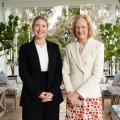Understanding the genetic basis of breast cancer – the most common cause of cancer death among Australian women – may lead to better diagnosis and the development of new preventative drugs, according to a University of Queensland researcher.
School of Molecular and Microbial Sciences lecturer Dr Melissa Brown is one of seven winners of the 2002 UQ Foundation Research Excellence Awards. Now in their fourth year, the awards recognise outstanding performance and leadership potential of early career researchers at The University of Queensland.
Dr Brown’s research investigates the cellular and molecular effects of disrupting the functioning of one of several breast cancer susceptibility genes isolated in the last decade, known as Breast Cancer One or BRCA1.
Around 10 percent of breast cancer cases are due to hereditary factors with up to half of these due to the abnormalities in BRCA1. Breast cancer affects approximately one in 11 women and every day in Australia, 25 women discover they have breast cancer. Currently in Australia, 100,000 women cope with diagnoses of breast cancer and the consequences.
It is the most common cause of cancer death in Australian women followed by colorectal and lung cancers.
Dr Brown’s research is broadly divided into two main areas: investigating the triggers to switching the BRCA1 gene on and off; and the actions of the gene’s protein product.
“We believe that in addition to regulating cell growth and the response to DNA damage, BRCA1 also regulates cell adhesion and the crucial structures at the ends of chromosomes known as telomeres,” Dr Brown said.
“Telomeres normally get shorter each time a cell divides and eventually end up too short for the cell to function ultimately causing its death. In cancer cases, these telomeres stop shortening resulting in the cell continuing to grow despite being old. This leads to tumour-formation
“In addition, BRCA1 seems to regulate the normal adhesion messages to cells which make them ‘sticky’ and able to form layers of tissues. So, you’ve got a situation where cells are floating off and continuing to grow when they should be sticking together and dying off once they are old.”
Dr Brown leads an eight-person laboratory at UQ consisting of three postdoctoral research fellows, one research assistant, three PhD students and one honours student. She said the award funds would be used to explore some novel approaches to her research outside the bounds of the two National Health and Medical Research Council (NHMRC) grants and one Queensland Cancer Fund (QCF) grant she currently holds.
“I am delighted with the award and see it as a tangible form of encouragement to persist with this important research area,” she said.
Dr Brown’s work schedule is divided between her research and teaching commitments. She lectures a molecular genetics course for first-, second-, and third-year Bachelor of Science students as well as Graduate Medical School and Dentistry School students.
She is a firm believer in the importance of combining research and teaching: “If you love what you’re doing, you don’t mind the teaching time. I really enjoy seeing my students getting excited about science,” she said.
“Also, in order to lecture well, you have to really understand your area well. I find lecturing often stimulates questions in my mind for my own research.”
Dr Brown, who holds a Bachelor of Science with honours from the University of Melbourne (1988) and a PhD from the Walter and Eliza Hall Institute (1993), came to UQ from her previous position as lecturer and research group leader in the Department of Biochemistry and Molecular Biology at the University of Melbourne (1998–2000).
Before this time, she worked in London, firstly as a postdoctoral research fellow at the Imperial Cancer Fund (1993–1997) and then as a research fellow in the Cancer Genetics Laboratory of King’s College London at Guy’s Hospital (1997–1998).
Married with a nine-month-old son, she said she said she was attracted to work at UQ because of its world-class laboratory facilities and location in Brisbane with its outstanding lifestyle and climate.
For more information, contact Dr Melissa Brown (telephone 07 3365 4628) or Shirley Glaister at UQ Communications (telephone 07 3365 2339).




